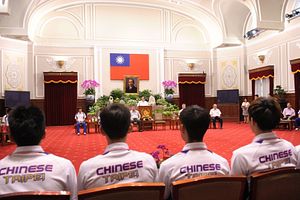Taiwan is set to vote on a public referendum item that could bring its shifting national identity into sharp focus.
Voters will decide on November 24 whether Taiwan’s athletes should compete in international sporting events, including the 2020 Tokyo Olympics, as “Taiwan” rather than “Chinese Taipei.” The referendum will go ahead despite the objections of the International Olympic Committee (IOC), which on November 16 warned that Taiwan may lose its right to compete in the 2020 Games should it insist on the name change.
Taiwan participates in international athletic competitions under the moniker “Chinese Taipei” per a 1981 agreement with the IOC. This compromise has since been upheld at the insistence of Beijing, which has already denounced the upcoming referendum.
The vote will serve as a benchmark of the ongoing evolution of Taiwanese identity. According to a poll conducted by Taiwan’s National Chengchi University (NCCU), 55.8 percent of respondents identified themselves as exclusively Taiwanese in 2018, up from only 17.6 percent in 1992. If successful, the vote could also serve as a precursor to a push for a popular vote on Taiwan’s independence, which is currently prohibited under Taiwan’s Referendum Act.
The ruling Democratic Progressive Party (DPP) has stayed clear of backing the referendum. If passed, it would create a political morass ahead of the 2020 re-election campaign of President Tsai Ing-wen, who has navigated a path of least resistance between pro-independence advocates in the “pan-green” (DPP-affiliated) political coalition and moderates who prefer to maintain the existing status quo with China.
The name-change vote, however, has acted as a symbolic placeholder for a push toward an independence referendum. In October, the pro-independence Formosa Alliance held a rally in Taipei to support the name change and call for a referendum in opposition of Chinese annexation. The DPP barred party members from attending and held its own anti-annexation rally in Kaohsiung on the same day.
The fissures within Taiwan’s pan-green camp come at a time when Tsai’s government has faced an unprecedented wave of attacks from Beijing on its sovereign status. These have notably entered the athletic realm: the 2019 East Asian Youth Games, scheduled to be held in Taichung, were canceled in July due to Chinese opposition to a then-prospective vote on the future of “Chinese Taipei.”
The IOC, for its part, has been unequivocal in warning Taiwan against changing its Olympic designation, saying a unilateral attempt to do so would threaten the eligibility of its athletes in international competitions. Its latest caution, delivered via a letter sent to the Chinese Taipei Olympic Committee (CTOC) and the Taiwanese government, reiterated that such a decision remains “under its jurisdiction.”
“The IOC is hoping that the interest of the Olympic Movement in Chinese Taipei will prevail over political considerations so as not to disrupt the CTOC delegation and the athletes in their preparation for upcoming international supporting events,” the letter said.
Taiwan’s athletes, past and present, are split on the proposal. While some, such as track and field medalist Chi Cheng, support the name change, others, including weightlifting gold medalist Hsu Shu-ching, have urged voters to ignore the referendum measure and preserve the eligibility of the country’s athletes.
Supporters of the referendum insisted on Tuesday that a “Yes” vote would not affect the rights of athletes to participate in the 2020 Tokyo Olympics, saying the referendum itself does not violate the Olympic Charter and would not be grounds for Taiwan’s banishment from the upcoming Games.
The referendum is just one of 10 matters up for public resolution on Saturday, along with ballot items on issues such as marriage equality and nuclear power. An item can pass if at least 25 percent of eligible voters cast “Yes” votes while also outnumbering “No” voters. This lowered threshold for passage comes courtesy of Referendum Act amendments approved in December 2017 with the support of DPP legislators.
However, the name-change measure highlights the reformed Referendum Act’s potential to complicate policymaking in Taiwan, especially as the DPP gears up for a 2020 presidential campaign that promises to present an asymmetric band of challengers to its brand of governance.
The DPP was established in 1989 as a pro-independence alternative to the ruling Kuomintang (KMT), but softened its position to appeal to moderate voters when, in 2000, Chen Shui-bian became the first DPP member elected to Taiwan’s highest office. While Tsai has taken a consistently acrimonious stance toward China since her election in 2016, she has thus far warded off calls within elements of her own party to push for Taiwan’s independence.
Should the upcoming referendum be successful, however, it would force the DPP into the uncomfortable position of legislating on a name change set to ignite the anger of Beijing – which sees it as a precursor to an independence vote – prior to both the 2020 Tokyo Games and January 2020’s presidential election.
NCCU’s latest public opinion study on the unification and independence stances of Taiwanese, released in June 2018, shows slight drops in support for a move toward independence, while the most popular response (33.4 percent) remains “Maintain status quo, decide at a later date.”
The upcoming name-change referendum, however, stands as a symbol that prominent and rising forces within Taiwanese politics continue to insist on that date coming much sooner than later.

































